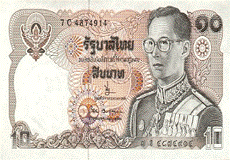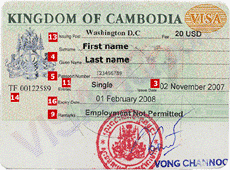Tip
 Business Hours: Banks:08:00 to 15:00, Monday to Friday, Shops: 08:00 to 20:00, daily, Markets: 06:00 to 17:00, daily, Government offices: 07:30 to 11:30 and 14:00 to 17:00, Monday to Friday, Business centres: 08:00 to noon and 14:00 to 17:00, Monday to Saturday.
Business Hours: Banks:08:00 to 15:00, Monday to Friday, Shops: 08:00 to 20:00, daily, Markets: 06:00 to 17:00, daily, Government offices: 07:30 to 11:30 and 14:00 to 17:00, Monday to Friday, Business centres: 08:00 to noon and 14:00 to 17:00, Monday to Saturday.
Cautions: The biggest caution when visiting Cambodia is to be aware of landmines, which are a problem throughout the country with somewhere between four and six million of them yet to be discovered. The most heavily-mined sections of the country remain Battambang, Banteay Meanchey, Pursat and Kampong Thom provinces. And even though the tourist areas of Siem Reap, Phnom Penh and Sihanoukville are considered mine-free, you should always stay on well-travelled paths, even around Angkor Wat, and travelling with a knowledgeable guide is recommended.
Even though Cambodia is a lot less politically-tense than in the past, foreign tourists need to avoid any demonstrations and political gatherings. Street crime is still high in the country and is a big problem in the capital. You should take care to never travel alone outside towns and cities, even in the day. At night, stick to travel by taxi, rather than moto or cyclo. Cambodia is a very poor country, and you should leave your valuables at home and dress modestly to avoid drawing attention to yourself. Electricity: 220v/50Hz.
Health: No vaccinations are required for entry into Cambodia however immunisation against cholera, typhoid and hepatitis A and B are recommended. If you’re going to spend extensive time in rural areas, then consult your doctor about preventing malaria, rabies and Japanese encephalitis. It’s a good idea to bring your International Vaccination Certificate with you.
There are no current, reliable statistics on HIV and AIDS infections in Cambodia; however, it’s likely to be high. You should exercise caution accordingly and bring condoms from home. Emergency services are pretty limited and medical care is not of an international standard. Additionally, hospitals expect immediate cash payments, so you will need to get receipts to be reimbursed by your insurance company. Evacuation to Bangkok, Thailand is the best option for serious complications. American Medical Centre: +855 23 991863, Emergency services: 119.
Language: Khmer, also called Cambodian, is the official language, but French is also spoken by the older generation as well as many who are educated. The younger generation has been learning English as a second language.
Visit this website for Khmer Translation Services.Currency Cambodia’s currency is the Cambodian riel (KHR) and denominations come in 100, 200, 500, 1,000, 2,000, 5,000, 10,000 and 20,000 notes with no coins used. However, the currency is soft and US dollars and Thai baht are much more popular.
 Currency Exchange: You can exchange money and travellers cheques at banks in major towns and cities. However, note that the US dollar is the de facto currency and you’ll do best to change few of them over to riel since most of your payments will be in dollars. Credit cards are only accepted in large hotels and high-end restaurants; otherwise this is a very much cash-only society. ATMs typically do not work with international cards, and don’t exist outside large cities.
Currency Exchange: You can exchange money and travellers cheques at banks in major towns and cities. However, note that the US dollar is the de facto currency and you’ll do best to change few of them over to riel since most of your payments will be in dollars. Credit cards are only accepted in large hotels and high-end restaurants; otherwise this is a very much cash-only society. ATMs typically do not work with international cards, and don’t exist outside large cities.
Customs: Adults aged 18 years and up are allowed to bring in 200 cigarettes or the equivalent in tobacco, an amount of perfume reasonable for personal use and one opened bottle of liquor. Currency in possession must be declared on arrival. Due to the history of looting of the country’s antiquities, it is forbidden to carry antiques or Buddhist reliquary out of Cambodia; however, taking home Buddhist statues and trinkets bought from souvenir stalls is permitted.
Etiquette: There is very much a sense of hierarchy and social status in Cambodia and although you may feel some people are asking you too many personal questions, it is to determine your ‘status’ rather than to be nosey. The society is also very collective, so the trend is to put the group before the individual. This means communication is structured so as to minimise conflict with others. In other words, it’s not polite to show anger or other strong emotions. ‘Face’ is very important and you should take great care not to cause someone to ‘lose face’ by criticising or embarrassing them in public.
The traditional greeting is a bow with the hands pressed together. The lower the bow and the higher the hands, the more respect is shown. People are addressed with the title lok for men and lok srey for women, followed by the first name. When you meet people in a group, the highest ranking person will be introduced first – and if you are introducing a group, you should do the same so the rank structure is understood by your Cambodian counterparts.
In business, handshakes have become the norm but you should beware not to shake too firmly as this can be interpreted as aggression. Women should initiate the handshake or bow, as they prefer. Eye contact between men and women is kept to a minimum. When exchanging business cards, the right hand or both hands should be used, and cards should be treated with respect indicative of the way you will treat the person.
If you’re invited to someone’s home, it is polite to take a small gift of sweets, flowers, fruit or pastries. Gifts are usually wrapped in colourful paper and you should never use white paper as it signifies mourning. When presenting the gift, use both hands; note that gifts are never opened when received. Shoes and hats must be removed before entering homes. When refreshments are offered they should be accepted even if you just take a sip or bite. If you are invited to sit on a mat on the floor, you should tuck your feet back, never cross or stretch your legs.
Punctuality is important as it is a sign of respect to the person you are meeting. There is an emphasis on modesty and humility so expect that compliments and praise will be responded to by a deprecating comment. Boasting is not appreciated and prolonged eye contact should be avoided. The head is considered the focal point of spiritual substance and it’s an extreme insult to touch another person’s head. Feet are the lowest point of the body and you should never touch anything or point with your feet; and shoes should be removed before entering temples and homes. Women cannot touch monks.
Although it would seem things are pretty relaxed in Cambodia, when it comes to dining in a restaurant, table manners are formal. If someone invites you to dinner, then wait for them to instruct you as to where to sit so you don’t upset arrangements. The oldest person is usually seated first and will start eating before others. You should never start eating until the eldest person has started. Business is not usually discussed in social settings. If you’re not sure what to do, just follow the lead of others.
 Visa and Passports: Visitors can obtain a visa on arrival at the airports in Phnom Penh and Siem Reap as well as at the border crossings on the Thai and Vietnamese borders. Your passport must be valid for 6 months and you’ll need to provide two passport-sized photos with the application. Visas are valid for 30 days and the fee is US$20 and must be paid in cash with a clean, unmarked bill. It’s also possible to procure a visa in advance at the nearest Cambodian embassy.
Visa and Passports: Visitors can obtain a visa on arrival at the airports in Phnom Penh and Siem Reap as well as at the border crossings on the Thai and Vietnamese borders. Your passport must be valid for 6 months and you’ll need to provide two passport-sized photos with the application. Visas are valid for 30 days and the fee is US$20 and must be paid in cash with a clean, unmarked bill. It’s also possible to procure a visa in advance at the nearest Cambodian embassy.
Visas can be extended through travel agents or at the Department for Foreigners of the Ministry of Interior (open 08:00 to 12:00, Monday to Friday) or at the Immigration Office (07:30 to 10:00 and 14:00 to 16:00, Monday to Friday), both in Phnom Penh; note that processing takes 10 days.